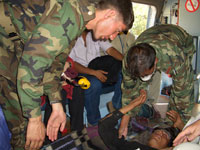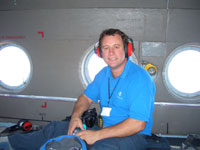Map mission accomplished, but quake effort goes on

Relief effort: A quake victim is airlifted out on a return journey to Islamabad
Eighteen-hour days and demanding deadlines were among the challenges faced by Sussex DPhil student Jonathan Douch in the race to save hundreds of thousands of lives in the aftermath of the Pakistan earthquake.
Jonathan, a volunteer mapper for UK-based charity MapAction, flew out to Pakistan last week to join a team at the UN temporary HQ in Islamabad. While there, he helped to create computerised maps that are being used by the many aid organisations to assess infrastructure damage and pinpoint suitable sites for helicopter pads and aid stations.
The worst-hit areas are scattered over mountain ranges that were subject to landfalls, aftershocks and devastating destruction following the earthquake in Pakistan, India and Afghanistan on October 8. MapAction acts as a rapid-response organisation, arriving soon after a disaster to create vital maps for aid agencies involved in rescue and aid operations, then moving out. The MapAction operation has now completed its work and has handed over to the UN's Humanitarian Information Centre in Islamabad.
Jonathan returned to the UK last week, exhausted after his week-long stint. He says: "We used Global Positioning System information and satellite images to produce maps for a lot of people - the UN, the Red Cross and Crescent, Oxfam, various medical charities, NATO and the Pakistan army. We analysed mountainous areas to find flat land for building on and landing helicopters - not easy in such mountainous areas. We also supplied visualisation maps so aid workers could orientate themselves, and daily updates to show where roads and bridges were open, and where the helipads were."

On a mission: Jonathan Douch aboard a UN helicopter
Jonathan also flew into the disaster zone to UN "hubs" - operational outposts in remote areas accessible by helicopter - to deliver maps and collect information. Jonathan says: "Talking to the UN people there, it's fair to say that this is a far more difficult logistical exercise than the tsunami relief effort. In fact, it's the most difficult operation they have ever encountered. Everyone is working as hard as they can. Many areas have no roads at all, and a lot of people have no shelter, food or medical care. People are using manure to cover wounds and tetanus is becoming a real problem."
Jonathan, 43, became involved with MapAction after hearing about their work from a colleague in the University of Sussex geography department, where Jonathan teaches geographical information systems (creating computerised maps using satellite images and GPS information).
A MapAction diary logged the progress of the mission, and the closing entry shows that for the relief effort, an enormous task remains: "What we have is a race against death. Unless aid in all its various forms - health, food, water, shelter - can be got to the people in need, the casualty rate will continue to rise inexorably, and the onset of winter presages an exponential increase in the effects of the disaster."
Notes for editors
University of Sussex press office contacts: Maggie Clune or Jacqui Bealing, tel: 01273 678 888 or email M.T.Clune@sussex.ac.uk or J.A.Bealing@sussex.ac.uk
For further information about MapAction, see http://www.mapaction.org/index.html
For further information about geography at the University of Sussex, see http://www.sussex.ac.uk/geography/
Useful links
Information for Journalists Previous press releases